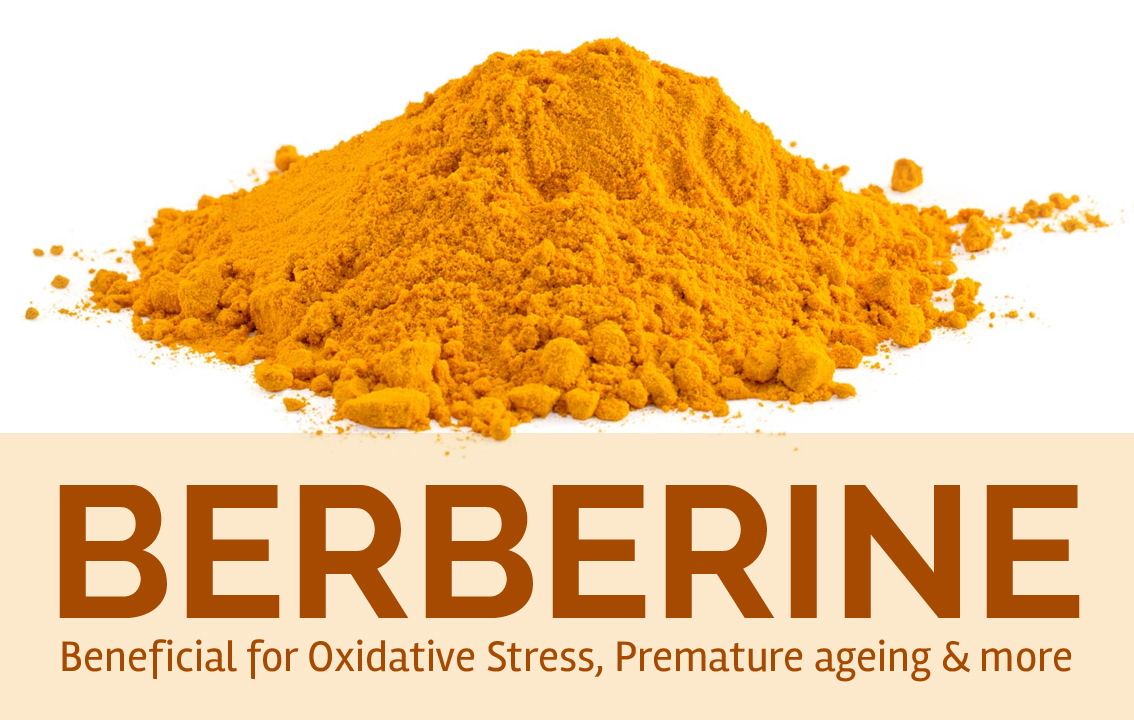
Health benefits of berberine
The properties and traditional uses of berberine have attracted considerable scientific interest. Researchers have identified multiple health benefits for this active principle.
- Reduces oxidative stress
Berberine is a natural antioxidant. This means it is able to combat oxidative stress – the accumulation of highly-reactive oxygen species that cause considerable damage in the body. [1]
- Fights premature ageing
Oxidative stress is known to play a role in the ageing process. As a result of its natural antioxidant potency, berberine thus helps to combat various effects of ageing. [2]
- Moderates inflammatory response
Berberine also has an anti-inflammatory effect which appears to be particularly effective against infection-induced inflammation. A number of studies have shown that taking berberine regularly can help reduce the body’s inflammatory response.
- Combats infection
As mentioned, berberine has been identified as the ingredient responsible for the anti-infection effects of berberidaceae plants. Featuring in several traditional Asian pharmacopoeia, these plants have been used for many years to fight infections such as infectious diarrhoea. Research has shown that berberine not only has anti-bacterial effects against staphylococcus, streptococcus and salmonella, but also anti-amoebic and anti-protozoan activity.
- Improves the lipid profile
Scientists have also highlighted berberine’s potential for lowering blood lipids. It appears to reduce blood cholesterol and triglycerides by activating a specific enzyme called AMPK. It may therefore offer significant potential for preventing health problems linked to excess weight and obesity. [4]
- Treats type 2 diabetes
Scientists have for some years been investigating the anti-diabetes action of berberine. It appears to have a similar capacity for lowering blood glucose levels as diabetes drugs such as metformin, with researchers showing that it reducing glycaemia via several mechanisms. It seems to increase insulin sensitivity, encourage glucose uptake and improve its use in the body. It may therefore help control the hyperglycaemia that characterises type 2 diabetes. [5]
- Prevents and treats NASH
Scientists have recently discovered a new health benefit for berberine: it may help prevent and treat non-alcoholic steatohepatitis (NASH). Within just a few years, this inflammatory liver condition has become a major public health issue. It is caused by abnormal accumulation of fat in liver cells, due largely to poor diet and lack of physical activity.
Where can berberine be found?
As a result of its many benefits, berberine is widely-recommended in the field of phytotherapy and has become very popular as a nutritional supplement. Extracted from various plants, this active principle is available in the following forms:
- Berberine supplements such as extract of Berberis vulgaris offered by SuperSmart which has the advantage of being standardised to 97% berberine;
- Synergistic formulations such as the anti-ageing supplement AMPK Booster which combines berberine with other natural principles to stimulate production of AMPK, the key metabolism enzyme.
References:
https://en.wikipedia.org/wiki/Berberine
http://diabetes.diabetesjournals.org/content/55/8/2256.short
Image Credit: www.drwhitaker.com
Comments
comments